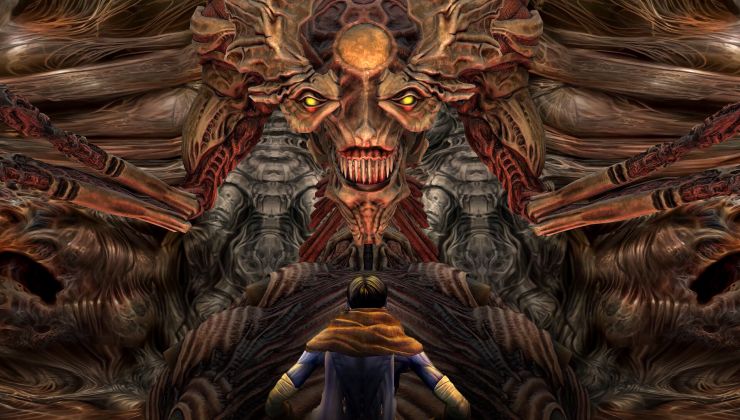A mod of Doom II that we covered a week ago set in the good old United Kingdom, Thatcher’s Techbase, is out now and sees you take down Subject M4GG-13 who is none other than former prime minister Margaret Thatcher. Risen from the dead and fresh out of Hell, Thatcher is up to something and it's your job to take 'em down.

Direct Link
Obviously political in nature, to the point that the game even tells you it's "dedicated to everyone that Thatcher hated and everyone that hated Thatcher". It has support for five difficult levels, co-op and deathmatch support, gamepad support and an original soundtrack too that has no restrictions on streaming so you can enjoy the music if you decide to livestream it or make videos.
How to get it? Head to the official site to download the WAD file and load it up with your favourite compatible Doom-like game engine including PRBoom, DSDA-Doom, ZDoom and GZDoom. For using GZDoom just make sure you have your "DOOM2.WAD" file and the "THATCHER.wad" inside here ~/.config/gzdoom/ and then run gzdoom -iwad DOOM2.WAD -file THATCHER.wad or just use your favourite launcher.
Tested it myself and it seems to work great.
It will need a copy of DOOM II which you can buy from GOG and Steam.
"dedicated to everyone that Thatcher hated and everyone that hated Thatcher"
*sigh* I'd just managed to calm down and come back here having forgotten what I was angry about when you publish another bit pushing this invective. I mean, if the term “hate speech” means anything, it must surely apply to the statement above. (And while I don't believe that Margaret Thatcher truly “hated” anyone, two wrongs don't make a right.) I like a bit of retro FPS action as much as the next guy, but there's never any reason to promote such mean-spirited spitefulness and hatred.
I'd say the same no matter who it was directed at, by the way. No wonder modern politics is so bitter and hateful, if we're prepared to let things like this slide just because we quietly agree with the sentiment. I said nothing under your first article, because although I find the game offensive I believe in freedom of speech and it seemed like a robust bit of satirical fun for people whose prejudices it reflects.
And even now, this comment has sat in my browser unposted for about three hours. But bringing it up again, especially with that quote, makes me think again, and wonder about what kind of site you're trying to run here. Come on... I thought you were better than this.
"dedicated to everyone that Thatcher hated and everyone that hated Thatcher"
*sigh* I'd just managed to calm down and come back here having forgotten what I was angry about when you publish another bit pushing this invective. I mean, if the term “hate speech” means anything, it must surely apply to the statement above. (And while I don't believe that Margaret Thatcher truly “hated” anyone, two wrongs don't make a right.) I like a bit of retro FPS action as much as the next guy, but there's never any reason to promote such mean-spirited spitefulness and hatred.
I'd say the same no matter who it was directed at, by the way. No wonder modern politics is so bitter and hateful, if we're prepared to let things like this slide just because we quietly agree with the sentiment. I said nothing under your first article, because although I find the game offensive I believe in freedom of speech and it seemed like a robust bit of satirical fun for people whose prejudices it reflects.
And even now, this comment has sat in my browser unposted for about three hours. But bringing it up again, especially with that quote, makes me think again, and wonder about what kind of site you're trying to run here. Come on... I thought you were better than this.
You know, I bet a lot of people could say: "we thought you were better than that".
I don't like guys that hide behind that kind of argument, the "hate" some of us can bring over Thatcher (or someone else like her) is not equal at all that the "hate" Thatcher provided on some people.
You would defend Pinochet too, wouldn't you?
Seriously it seems some people can't understand properly what these people have done.
I, again, recommend some to read "The Shock Doctrine: The Rise of Disaster Capitalism" by Naomi Klein. After you done that, I dare you to tell me you don't have any hate towards these people.
You think "hate" is bad no matter what, don't you?
If yes, you're part of the problem, sorry. You shouldn't play that "game".
I can't tolerate nor respect people for whom there have been disastrous consequences, period.
But bringing it up again, especially with that quote, makes me think again, and wonder about what kind of site you're trying to run here. Come on... I thought you were better than this.Better than...what? I wrote about a game on a gaming site. It's literally what we're here for. I'm not going to be scared away from posting games that are political (which tons are, even when they say they're not).
You're taking it far too seriously.
"dedicated to everyone that Thatcher hated and everyone that hated Thatcher"
*sigh* I'd just managed to calm down and come back here having forgotten what I was angry about when you publish another bit pushing this invective. I mean, if the term “hate speech” means anything, it must surely apply to the statement above. (And while I don't believe that Margaret Thatcher truly “hated” anyone, two wrongs don't make a right.) I like a bit of retro FPS action as much as the next guy, but there's never any reason to promote such mean-spirited spitefulness and hatred.
I'd say the same no matter who it was directed at, by the way. No wonder modern politics is so bitter and hateful, if we're prepared to let things like this slide just because we quietly agree with the sentiment. I said nothing under your first article, because although I find the game offensive I believe in freedom of speech and it seemed like a robust bit of satirical fun for people whose prejudices it reflects.
And even now, this comment has sat in my browser unposted for about three hours. But bringing it up again, especially with that quote, makes me think again, and wonder about what kind of site you're trying to run here. Come on... I thought you were better than this.
It's very fair to say that a lot of people hated Thatcher.
It was evident, bluntly so, even at the time. Maybe it's different across the pond, but at least in the UK, there's a very, VERY strong history of mocking and deriding politicians for their numerous issues and idiocies. A Doom mod I wouldn't even say is a major one, particularly several years after she's already passed.
I say this because even during her time as PM it wasn't even just in the papers, but prime-time TV would relentlessly mock her and all politicians. Spitting Image was coming into its height and it was thoroughly scathing of all the politicians, Thatcher most often included. Seriously, look it up, there's plenty of clips on youtube. Even at her time as PM, she was being derided thoroughly for her policies and often made out the be basically (at least my interpretation) an embodiment of the concept of "the banality of evil" in her thought processes and behaviour.
Last edited by subedii on 25 September 2021 at 7:01 pm UTC
I say this because even during her time as PM it wasn't even just in the papers, but prime-time TV would relentlessly mock her and all politicians. Spitting Image was coming into its height and it was thoroughly scathing of all the politicians, Thatcher most often included. Seriously, look it up, there's plenty of clips on youtube. Even at her time as PM, she was being derided thoroughly for her policies and often made out the be basically (at least my interpretation) an embodiment of the concept of "the banality of evil" in her thought processes and behaviour.
I don't need to look it up. I was there. There's a line between satire and open hatred.
Just to be clear: anyone who openly dedicates a work to people who hate, or defends that dedication, surrenders the right to complain about “hate speech”. Period. And that's what I'm exercised about here. Oh sure, “it's just a bit of fun”. So don't complain when others have fun that offends you.
Would you cover a mod about shooting abortionists, Liam? Not that I would defend that either, but would you?
Just to be clear: anyone who openly dedicates a work to people who hate, or defends that dedication, surrenders the right to complain about “hate speech”. Period. And that's what I'm exercised about here. Oh sure, “it's just a bit of fun”. So don't complain when others have fun that offends you.Was it the word "hate" that set you off? Surely you agree that saying you hate something isn't automatically hate speech. I doubt hating the well documented destructive legacy of a past political leader qualifies as such. Most definitions of hate speech boil down to something like "public speech expressing or advocating animosity or violence towards a group of people based on a shared characteristic such as ethnicity, race, sexual orientation or religion", but maybe you've got a different definition in mind?
Would you cover a mod about shooting abortionists, Liam? Not that I would defend that either, but would you?You're actually of the mind that a mocking, satirical game about fighting an extremely violent demonic reincarnation of a (long-dead) right wing politician is comparable to a game glorifying violence towards a random selection of people mostly targeted by religious extremists? Would you accuse Cambodians expressing hate for Pol Pot of hate speech? You might say that this is an extreme example as well, but at least it's a lot more relevant.
Just to be clear: anyone who openly dedicates a work to people who hate, or defends that dedication, surrenders the right to complain about “hate speech”. Period.Nonsense. Category error. Laws about, and discussion of, "hate speech" are not about individuals. There's plenty of perfectly legal talk about individuals that would be considered hate speech if it was about some identifiable group. What you can't say about individuals is governed largely by things like slander and libel laws, which mainly proscribe false factual statements, not expressions of hatred as such.
And there are good reasons for this, both in terms of societal health and in terms of whether such speech can be morally defensible. Obviously, it can't be accurate to ascribe some negative feature to all members of a group, since on average people are people. For a constellation of reasons of which "it just can't be true" is only the beginning, it clearly can't be morally defensible to preach hate against all members of some racial, religious or other whole category of people. It is also damaging to society to set groups within it against each other.
Hatred of individuals is a rather different story. To take a somewhat extreme example, where I live in British Columbia there have been a couple of notorious serial murderers, Clifford Olson and Willie Pickton. Everyone hates their guts, obviously, because they are (or were, I think Olson finally died in prison) horrible, vicious people without conscience who did monstrous things. So nobody's going to complain a whole lot about hating those two guys, or expressing that hatred, saying very bad things about them and so on. But say someone wasn't an actual murderer--say they were a con artist who bilked old pensioners of all their savings, leaving dozens of people destitute and in some cases homeless. I think the case is pretty strong that it would still be OK to hate that person, express hate towards them and so on. So the question isn't whether it's OK to hate individuals, or say bad things about individuals because you hate them; the question is where the line should be drawn between people that it's OK to hate and people that it's not OK to hate.
Then there are people one knows personally--the horrible boss, the school bully or whoever. I find it hard to say nobody should ever be allowed to hate anyone personally.
So, then, Margaret Thatcher, and politicians. Should politicians be exempt due to the particular nature of what they do? There is often a sort of presumption made about politicians that, no matter what their expressed ideology, they should get a pass of sorts because they should be assumed to believe that application of that ideology and their policies will have net positive effects, no matter how absurd it might be to believe such a thing. It's rarely expressed this explicitly, but politicians are assumed to be acting in good faith--or at least, even if we have doubts that they really are, we should sort of pretend to believe it unless there is proof to the contrary. And having assumed that they are acting in good faith and that their chosen policies are intended to benefit everyone, or at least the most people possible, in the long run at least, we can then follow a logic saying that one shouldn't hate them for those policies, no matter how damaging they might be: The politician was doing their best, they didn't intend to do damage, so hate is not legitimate.
(Incidentally, this may be one of the reasons for the outrage much of the political and commentator class had about Trump--he made it so incredibly obvious that this professional courtesy was not deserved, with the transparency of his willingness to say absolutely anything that was convenient for him in the moment)
I question both ends of that. First, many politicians are quite consciously engaged in deception, trying to convince the public to embrace policies and ideologies that they know perfectly well will harm most of that same public, because it benefits them personally or a relatively small group they consider themselves to belong to. They are virtually identical to the confidence trickster above, only on a mass scale. It is clearly as legitimate to hate them as it is to hate anyone causing major harm for profit.
Others are in an odd middle ground . . . they believe in their ideology, more or less, but deep down they know there's something dodgy; they tell lies that they know are lies in specific, but tell themselves that the spirit of what they're saying is true; they carefully avoid looking at the impact of what they do, or thinking about anything that may make them feel uncomfortable. Hypocrites, cowards, just not looking at the side their bread isn't buttered on, but not quite consciously doing damage for profit. Should one hate such people? Perhaps not, although I'd find it hard to object to "contempt".
But even if someone is completely sincere, just how much damage should they get a pass for? At what point does stubbornness become an insufficient excuse for dealing death? Which brings us to Margaret Thatcher. Margaret Thatcher is clearly responsible for a mountain of excess deaths and mass impoverishment--far more than any serial murderer or confidence trickster. It is possible to persuade oneself that she sincerely thought this would in some way be for the best in the long run, but it's hard to persuade oneself that she cared. Thatcher was callous, apparently utterly lacking in empathy; she may not have been enthusiastic about the damage she caused as such, although there were times it seemed she thought anyone crushed by her policies deserved it, but she clearly was at best indifferent to the suffering and death she caused, and she encouraged others to be similarly callous. Any non-politician who caused as much damage as Thatcher did with as little conscience, there would be no controversy about hating them. Should she get a pass because she was in politics?
I think not. And indeed, I think serious excoriation and hatred of people who do that much damage serves a social purpose: Discouraging other people from getting ideas about doing the same. Oddly, I don't personally hate Thatcher. I think she was evil, but I'm a Canadian--my relationship to her isn't personal enough for hate. But I'm not going to say hating her would be illegitimate. I'd probably really hate her guts if I was British.
Just to be clear: anyone who openly dedicates a work to people who hate, or defends that dedication, surrenders the right to complain about “hate speech”. Period.Nonsense. Category error. Laws about, and discussion of, "hate speech" are not about individuals. There's plenty of perfectly legal talk about individuals that would be considered hate speech if it was about some identifiable group. What you can't say about individuals is governed largely by things like slander and libel laws, which mainly proscribe false factual statements, not expressions of hatred as such.
And there are good reasons for this, both in terms of societal health and in terms of whether such speech can be morally defensible. Obviously, it can't be accurate to ascribe some negative feature to all members of a group, since on average people are people. For a constellation of reasons of which "it just can't be true" is only the beginning, it clearly can't be morally defensible to preach hate against all members of some racial, religious or other whole category of people. It is also damaging to society to set groups within it against each other.
Hatred of individuals is a rather different story. To take a somewhat extreme example, where I live in British Columbia there have been a couple of notorious serial murderers, Clifford Olson and Willie Pickton. Everyone hates their guts, obviously, because they are (or were, I think Olson finally died in prison) horrible, vicious people without conscience who did monstrous things. So nobody's going to complain a whole lot about hating those two guys, or expressing that hatred, saying very bad things about them and so on. But say someone wasn't an actual murderer--say they were a con artist who bilked old pensioners of all their savings, leaving dozens of people destitute and in some cases homeless. I think the case is pretty strong that it would still be OK to hate that person, express hate towards them and so on. So the question isn't whether it's OK to hate individuals, or say bad things about individuals because you hate them; the question is where the line should be drawn between people that it's OK to hate and people that it's not OK to hate.
Then there are people one knows personally--the horrible boss, the school bully or whoever. I find it hard to say nobody should ever be allowed to hate anyone personally.
So, then, Margaret Thatcher, and politicians. Should politicians be exempt due to the particular nature of what they do? There is often a sort of presumption made about politicians that, no matter what their expressed ideology, they should get a pass of sorts because they should be assumed to believe that application of that ideology and their policies will have net positive effects, no matter how absurd it might be to believe such a thing. It's rarely expressed this explicitly, but politicians are assumed to be acting in good faith--or at least, even if we have doubts that they really are, we should sort of pretend to believe it unless there is proof to the contrary. And having assumed that they are acting in good faith and that their chosen policies are intended to benefit everyone, or at least the most people possible, in the long run at least, we can then follow a logic saying that one shouldn't hate them for those policies, no matter how damaging they might be: The politician was doing their best, they didn't intend to do damage, so hate is not legitimate.
(Incidentally, this may be one of the reasons for the outrage much of the political and commentator class had about Trump--he made it so incredibly obvious that this professional courtesy was not deserved, with the transparency of his willingness to say absolutely anything that was convenient for him in the moment)
I question both ends of that. First, many politicians are quite consciously engaged in deception, trying to convince the public to embrace policies and ideologies that they know perfectly well will harm most of that same public, because it benefits them personally or a relatively small group they consider themselves to belong to. They are virtually identical to the confidence trickster above, only on a mass scale. It is clearly as legitimate to hate them as it is to hate anyone causing major harm for profit.
Others are in an odd middle ground . . . they believe in their ideology, more or less, but deep down they know there's something dodgy; they tell lies that they know are lies in specific, but tell themselves that the spirit of what they're saying is true; they carefully avoid looking at the impact of what they do, or thinking about anything that may make them feel uncomfortable. Hypocrites, cowards, just not looking at the side their bread isn't buttered on, but not quite consciously doing damage for profit. Should one hate such people? Perhaps not, although I'd find it hard to object to "contempt".
But even if someone is completely sincere, just how much damage should they get a pass for? At what point does stubbornness become an insufficient excuse for dealing death? Which brings us to Margaret Thatcher. Margaret Thatcher is clearly responsible for a mountain of excess deaths and mass impoverishment--far more than any serial murderer or confidence trickster. It is possible to persuade oneself that she sincerely thought this would in some way be for the best in the long run, but it's hard to persuade oneself that she cared. Thatcher was callous, apparently utterly lacking in empathy; she may not have been enthusiastic about the damage she caused as such, although there were times it seemed she thought anyone crushed by her policies deserved it, but she clearly was at best indifferent to the suffering and death she caused, and she encouraged others to be similarly callous. Any non-politician who caused as much damage as Thatcher did with as little conscience, there would be no controversy about hating them. Should she get a pass because she was in politics?
I think not. And indeed, I think serious excoriation and hatred of people who do that much damage serves a social purpose: Discouraging other people from getting ideas about doing the same. Oddly, I don't personally hate Thatcher. I think she was evil, but I'm a Canadian--my relationship to her isn't personal enough for hate. But I'm not going to say hating her would be illegitimate. I'd probably really hate her guts if I was British.
Purple Library Guy strikes again.
Just to be clear: anyone who openly dedicates a work to people who hate, or defends that dedication, surrenders the right to complain about “hate speech”. Period.Nonsense. Category error. Laws about, and discussion of, "hate speech" are not about individuals. There's plenty of perfectly legal talk about individuals that would be considered hate speech if it was about some identifiable group. What you can't say about individuals is governed largely by things like slander and libel laws, which mainly proscribe false factual statements, not expressions of hatred as such.
And there are good reasons for this, both in terms of societal health and in terms of whether such speech can be morally defensible. Obviously, it can't be accurate to ascribe some negative feature to all members of a group, since on average people are people. For a constellation of reasons of which "it just can't be true" is only the beginning, it clearly can't be morally defensible to preach hate against all members of some racial, religious or other whole category of people. It is also damaging to society to set groups within it against each other.
Hatred of individuals is a rather different story. To take a somewhat extreme example, where I live in British Columbia there have been a couple of notorious serial murderers, Clifford Olson and Willie Pickton. Everyone hates their guts, obviously, because they are (or were, I think Olson finally died in prison) horrible, vicious people without conscience who did monstrous things. So nobody's going to complain a whole lot about hating those two guys, or expressing that hatred, saying very bad things about them and so on. But say someone wasn't an actual murderer--say they were a con artist who bilked old pensioners of all their savings, leaving dozens of people destitute and in some cases homeless. I think the case is pretty strong that it would still be OK to hate that person, express hate towards them and so on. So the question isn't whether it's OK to hate individuals, or say bad things about individuals because you hate them; the question is where the line should be drawn between people that it's OK to hate and people that it's not OK to hate.
Then there are people one knows personally--the horrible boss, the school bully or whoever. I find it hard to say nobody should ever be allowed to hate anyone personally.
So, then, Margaret Thatcher, and politicians. Should politicians be exempt due to the particular nature of what they do? There is often a sort of presumption made about politicians that, no matter what their expressed ideology, they should get a pass of sorts because they should be assumed to believe that application of that ideology and their policies will have net positive effects, no matter how absurd it might be to believe such a thing. It's rarely expressed this explicitly, but politicians are assumed to be acting in good faith--or at least, even if we have doubts that they really are, we should sort of pretend to believe it unless there is proof to the contrary. And having assumed that they are acting in good faith and that their chosen policies are intended to benefit everyone, or at least the most people possible, in the long run at least, we can then follow a logic saying that one shouldn't hate them for those policies, no matter how damaging they might be: The politician was doing their best, they didn't intend to do damage, so hate is not legitimate.
(Incidentally, this may be one of the reasons for the outrage much of the political and commentator class had about Trump--he made it so incredibly obvious that this professional courtesy was not deserved, with the transparency of his willingness to say absolutely anything that was convenient for him in the moment)
I question both ends of that. First, many politicians are quite consciously engaged in deception, trying to convince the public to embrace policies and ideologies that they know perfectly well will harm most of that same public, because it benefits them personally or a relatively small group they consider themselves to belong to. They are virtually identical to the confidence trickster above, only on a mass scale. It is clearly as legitimate to hate them as it is to hate anyone causing major harm for profit.
Others are in an odd middle ground . . . they believe in their ideology, more or less, but deep down they know there's something dodgy; they tell lies that they know are lies in specific, but tell themselves that the spirit of what they're saying is true; they carefully avoid looking at the impact of what they do, or thinking about anything that may make them feel uncomfortable. Hypocrites, cowards, just not looking at the side their bread isn't buttered on, but not quite consciously doing damage for profit. Should one hate such people? Perhaps not, although I'd find it hard to object to "contempt".
But even if someone is completely sincere, just how much damage should they get a pass for? At what point does stubbornness become an insufficient excuse for dealing death? Which brings us to Margaret Thatcher. Margaret Thatcher is clearly responsible for a mountain of excess deaths and mass impoverishment--far more than any serial murderer or confidence trickster. It is possible to persuade oneself that she sincerely thought this would in some way be for the best in the long run, but it's hard to persuade oneself that she cared. Thatcher was callous, apparently utterly lacking in empathy; she may not have been enthusiastic about the damage she caused as such, although there were times it seemed she thought anyone crushed by her policies deserved it, but she clearly was at best indifferent to the suffering and death she caused, and she encouraged others to be similarly callous. Any non-politician who caused as much damage as Thatcher did with as little conscience, there would be no controversy about hating them. Should she get a pass because she was in politics?
I think not. And indeed, I think serious excoriation and hatred of people who do that much damage serves a social purpose: Discouraging other people from getting ideas about doing the same. Oddly, I don't personally hate Thatcher. I think she was evil, but I'm a Canadian--my relationship to her isn't personal enough for hate. But I'm not going to say hating her would be illegitimate. I'd probably really hate her guts if I was British.
Thanks for this. Your postings are a joy to read. Well informed and formulated eloquently.











See more from me